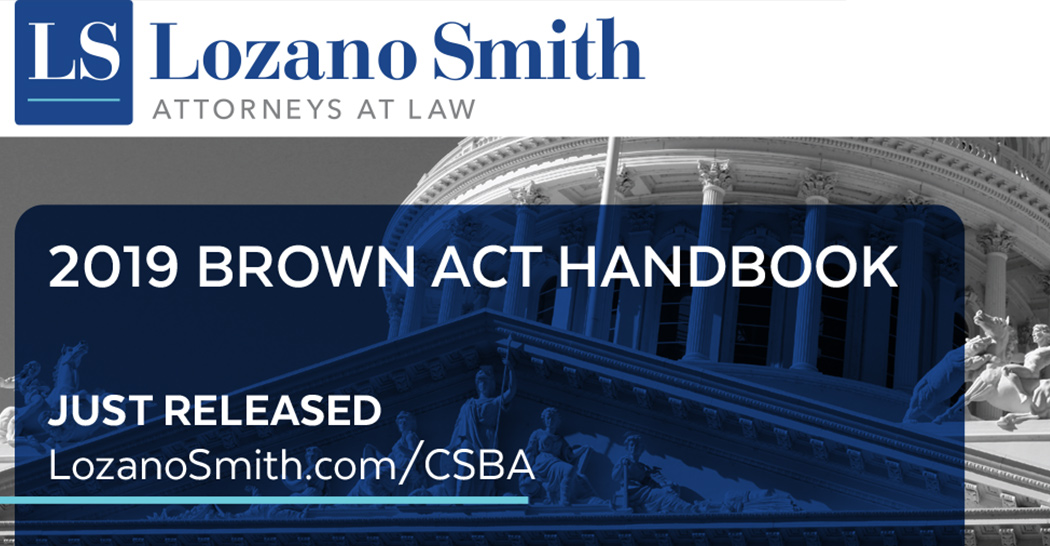

As part of his first budget press conference on Jan. 10, Gov. Gavin Newsom good-naturedly name-dropped California school board members and CSBA, highlighting the persistent and ardent advocacy of CSBA and governing board members statewide on pensions and other fiscal concerns.
“We are adding an additional $3 billion into immediate relief to school districts to address their STRS anxiety…,” the Governor said. The Governor’s $3 billion proposal for CalSTRS contribution rates is one-time non-Proposition 98 General Fund money and would all be paid out during the 2019-20 budget year. The proposal includes a $700 million ($350 million each for 2019-20 and 2020-21) direct buy-down of employer contribution rates, reducing rates by 1 percent in each of those two budget years, and $2.3 billion committed to reduce the employer unfunded liability, with a resulting 0.5 percent projected reduction in employer contributions beginning in 2021-22.
- Visit www.csba.org/Newsroom for links to digital versions of current and past issues of California School News.

California Attorney General Xavier Becerra issued an advisory opinion (No. 11-201, dated Dec. 26, 2018) concluding that charter schools and their governing bodies are subject to the Ralph M. Brown Act and the California Public Records Act. The Attorney General also concluded that the governing bodies of charter schools are subject to both Government Code section 1090, which prohibits conflicts of interest in public contracts, and the Political Reform Act of 1974. Finally, the books and records of a charter school authorized by a school district’s board or a county office of education’s board are subject to review and inspection by a grand jury, whereas charter schools authorized by a State Board of Education are not subject to the same review or inspection.
A majority of charter schools already regularly comply with open meetings and public records rules, and advocates for charter schools have strongly opposed legally forcing charter schools to comply with the Brown Act and the Public Records Act. Others have argued that entities which operate with public funds should be held to a higher standard with open access of information and protections against conflicts of interest.


Troy Flint | tflint@csba.org
Managing Editor:
Kimberly Sellery | ksellery@csba.org
Marketing Director:
Serina Pruitt | spruitt@csba.org
Staff Writers and Contributors:
Hugh Biggar | hbiggar@csba.org
Aaron Davis | adavis@csba.org
Mike Ambrose | mambrose@csba.org
Andrew Cummins | acummins@csba.org
Graphic Design Manager:
Kerry Macklin | kmacklin@csba.org
Senior Graphic Designer:
Carmen Rodriguez | crodriguez@csba.org
Emma Turner | La Mesa-Spring Valley SD
President-elect:
Xilonin Cruz-Gonzalez | Azusa USD
Vice President:
Tamara Otero | Cajon Valley Union USD
Immediate Past President:
Mike Walsh | Butte COE
CEO & Executive Director:
Vernon M. Billy
News and feature items submitted for publication are edited for style and space as necessary.


Schools receive pension relief: CSBA spoke and the Governor listened
It’s always nice to have your hard work validated by others. It’s even nicer when the person recognizing your efforts is the Governor of California. During Gov. Gavin Newsom’s inaugural budget proposal address, he let everyone know what a strong impression CSBA made on the subject of pension relief. In the Governor’s own words: “I will never forget our school boards association meeting, where they almost, quite literally, didn’t want to talk about anything else.”
Gov. Newsom couldn’t help but shake his head and chuckle as he recalled the tenacity our members displayed. Evidently, the message was received because the Governor’s budget proposal includes what he described as $3 billion of “immediate relief to school districts to address their STRS anxiety.”
governance
It is essential for governing board members to be familiar with information about the March 15 notice, its implementation process and the strict legal requirements attached to the process.

The March 15 notice is a formal, written announcement from a school district to administrators, certificated employees and others — required by Education Code section 44949 — informing them that they may be released, demoted or reassigned for the following school year beginning July 1. Before March 15, the district board must adopt a resolution stating that services are to be reduced and/or discontinued and that it is necessary to reduce the staff, specifying the extent of the reduction. The resolution must also direct the superintendent to notify affected employees.
2019 CSBA Delegate Assembly ballots have been mailed
The ballot materials for the election of a representative to the CSBA Delegate Assembly have been mailed to all CSBA member school districts and county offices of education. Each member board as a whole may vote for up to the number of vacancies in the region or subregion as indicated on the ballot and may cast no more than one vote for any one candidate. Ballots must be postmarked by the U.S. Postal Service on or before Friday, March 15, 2019, and be returned to CSBA.
For more information, or if you have questions, please call the CSBA Executive Office at (800) 266-3382.
governance
State Board adopts new requirements for districts in LCAP process
Interim changes are coming to the Local Control Accountability Plan template, but a much larger revision is likely still a few years out.

As part of that process, the State Board of Education approved a new LCAP section at its January meeting. The revision is designed to comply with the federal Every Student Succeeds Act’s rules for improving low-performing schools. Districts with schools targeted for assistance through the California School Dashboard must now verify that each school includes a description of how it identifies, examines and addresses weaknesses and needs in order to improve student outcomes. District officials will maintain local control and accountability by working with the school site council to develop the plan for student achievement. The change takes effect for the 2019-20 school year.
leadership

Turner brings decades of leadership experience to the position. She retired from the United States Navy in 2004 after serving 27 years and rising through the ranks to become an officer in the Judge Advocate General’s Corps. Along the way, she earned a doctorate in psychology while raising a family.
Upon retirement, she turned to civic service, and in 2008, became a trustee of La Mesa-Spring Valley SD — a San Diego County district of about 12,300 students in grades K-8. After her election to the school board, Turner also joined CSBA and received training in school governance and leadership, ultimately earning a Masters in Governance from the organization. While serving her community as a board member, Turner has worked in many roles with CSBA and other educational organizations. At CSBA, Turner has served as a Delegate and Director-at-Large, African-American and as Vice President and President-elect.
governance
CSBA Institute for New and First-Term Board Members helps answer ‘what’s next?’
From the Redwood Coast to the Coachella Valley, about 80 newly elected district and county board members gathered Jan. 3–4 in Sacramento to focus on “what’s next.” With their campaigns finished and a largely procedural first board meeting under their belts, attendees learned about effective governance, finance, human resources and student learning at CSBA’s popular Institute for New and First-term Board Members.
Governance Consultant and former school board member Luan Burman Rivera started the program by outlining the key concepts of effective boards and teamwork. She stressed that new members need to check their individual campaign promises at the door and focus on the successes of the governance team.
As mentioned previously in this column, an updated version of the California School Dashboard was recently released. The Dashboard provides districts and county offices of education with local data to support their ability to identify strengths and gaps, and to align resources that support efforts focused on student achievement. In addition, district staff will soon present a mid-year status report of the district’s Local Control Accountability Plan to governing boards. The LCAP mid-year review is a time to monitor the district’s progress and evaluate programs and services.

The Dashboard data, paired with the LCAP mid-year review, provides board members with a picture of the status of student achievement within the district. There are several questions the board may consider posing during the review which would lead to data-informed discussions and decision making, and to ensure Dashboard results are addressed and LCAP goals are being met.
Program monitoring: Are the programs underway still aligned with the LCAP goals? If yes, where are we seeing growth and progress? If not, what is the cause and what is being done to re-align them? In what areas is anticipated progress not being met and why? What additional information and/or resources would we need to make strategic decisions to align programs with LCAP goals?
Resource allocation and alignment: What budget allocations have been encumbered? How much is yet to be spent? Are there sufficient funds to execute the programs? If not, what is the recommendation for additional funds? What are the readjustments that the board should consider in the budget and why?
Community input: How is the Dashboard data shared with the community to demonstrate the importance of stakeholder engagement and support for student achievement? How is the community informed/engaged when new programs and services are introduced in the district? How is student voice reflected in the program recommendation and evaluation process?
Thinking through these guiding questions can help to create thoughtful board discussions that set the direction for your district. More information is also available through the Student Learning and Achievement module of the CSBA Masters in Governance Course 2. Information can be found at www.csba.org.
Comprehensive school safety plans:
Content, collaboration and compliance
Schools are the second-most common location for active shooting incidents, according to the State Auditor’s 2017 report School Violence Prevention. Far more likely threats to student safety include bullying, harassment, child abuse and natural disasters. One of the most important ways schools can protect students and staff from harm is to ensure a positive school climate that will not only reduce the likelihood of violent crime on campus, but also improve student outcomes and well-being.
With these issues in mind, the California Department of Education requires each school to develop and annually review a comprehensive school safety plan. Board members play a critical role in this process and are encouraged to review CSBA sample board policy and administrative regulation BP/AR 0450 – Comprehensive Safety Plan, which contains a complete list of plan components.
There’s a lot of expertise in the iTV Cable 16 studio at the San Diego County Office of Education, and the team is sharing that knowledge with students in the new iTV Learning Lab.
About 200 students participated in the lab in the fall, which offers them an authentic industry experience using the equipment, techniques and storytelling skills they need to work in the entertainment industry.
“This was one of my best and favorite experiences of the four years I’ve been in high school,” said Alena Martinez, a senior at San Marcos High School who participated last month. “I thought it was going to be more of a watch-and-learn thing, but it was a lot of hands-on learning, which I thought was really fun and cool to experience.”
Don’t miss the County Board Governance Workshop, a two-day event on Friday, March 8 and Saturday, March 9, 2019. Sponsored by the California County Boards of Education, the workshop takes place at the Embassy Suites Hotel in Sacramento, about 15 minutes from Sacramento International Airport. A wide breadth of timely and relevant topics will be covered, including effective governance, budget and finance, the county board’s appellate role, as well as community advocacy and leadership.
The inaugural Education Summit of Neighborhood Councils in Los Angeles kicked off in Los Angeles in October. CSBA Director Kelly Gonez (Region 21) and her team spearheaded the event, working with the Department of Neighborhood Empowerment.
The Education Summit aimed to direct more resources to local schools in members’ neighborhood council districts. Each of the 98 Neighborhood Councils represent approximately 20,000 constituents, has a budget of $42,000 and about 20 locally elected members. There is a staff of roughly 20 people supporting their efforts.
CCBE County Board Governance Workshop
Masters in Governance Courses 1 and 2
Legislative Action Day
Masters in Governance Courses 3 and 4
Masters in Governance Course 5






